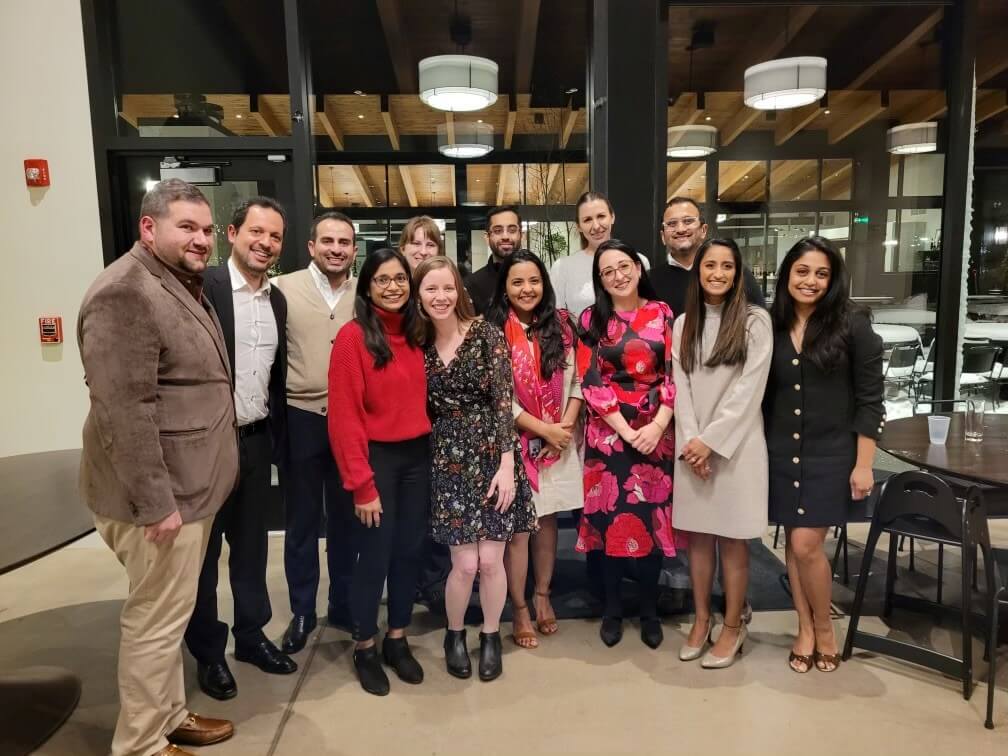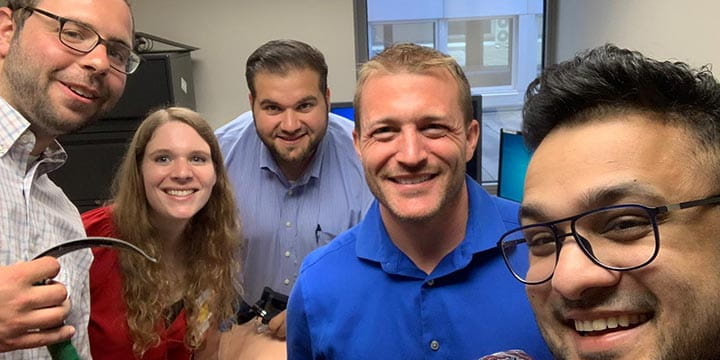Pulmonary Fellowship Research

The goal of the Case Western Reserve University/University Hospitals Cleveland Medical Center/Cleveland VA Medical Center Pulmonary and Critical Care Fellowship divisional research training is to allow fellows to pursue a project in their area of interest while providing them with a high-quality experience that fosters intellectual development. We are committed to providing the necessary support required to allow our fellows to be successful in their research careers.
First Year: Connect with Research Faculty & Project Planning
Our first-year fellows have a “meet and greet” with our affiliated research faculty. That is a first contact, so to speak. The program director meets with fellows to find in what direction the fellows research interests are leaning. At that point, the fellowship committee meets and provides a list of potential mentors for the fellow to seek out. The fellow and mentor develop a concept/plan and present that to the fellowship committee at the end of the first year.
Second Year: Research Implementation
The goal of the second year is for fellows to solidify a project and obtain preliminary data with the goal of presenting at a national conference, such as the American Thoracic Society (ATS), The American College of Chest Physicians (ACCP), Federation of American Societies for Experimental Biology (FASEB) or Society of Critical Care Medicine (SCCM).
At the beginning of this year, fellows and their mentors further develop the fellow’s research project in detail. The first month of the second-year fellows participate in an intense biostatistics/epidemiology course. After that, the fellow is expected to go to the lab and learn the various techniques involved in accomplishing their research project, particularly required basic science laboratory techniques.
Third Year Provides Support for Ongoing Research Projects
The major goal of the third-year research experience is to help the fellow make career decisions and aid in their career preparation.
All fellows in a research path are strongly encouraged to write an American Lung Association Fellowship grant at the start of their third year as part of their training. During the third year, fellows continue work on their ongoing research projects with the expectation of presenting their continuing results at national conferences and completing a manuscript. Abstract presentation at a national meeting is required for completion of the program.
The Pulmonary and Critical Care Fellowship Program has the advantage of access to the vast resources of both UH Cleveland Medical Center and the Cleveland VA Medical Center, in collaboration with Case Western Reserve University, along with the entire research enterprise. Thus, the massive learning and research opportunities are truly boundless. Below is a brief list of areas in which previous fellows have worked:
- Control of breathing
- Cystic fibrosis
- Genetics
- Granulomatous lung disease
- HIV
- Immunology
- Inflammatory lung disease
- Lung cancer
- Muscle physiology
- Pulmonary vascular disease
- Quality improvement
- Sleep medicine
- Tuberculosis
- Medical Education
Opportunity for Fourth Year Research
Upon completion of the fellowship a fourth year research fellowship is possible and is decided on a case-by-case basis. The offer of a fourth year is dependent on success during the fellow’s research program, growth during the research project and dedication to an academic career.
In this training program our fellows have been successful in obtaining entry-level funding through the American Heart Association and the SmithKline Foundation. In addition, we have been successful in identifying those individuals that have an interest in academic medicine to retain in academic positions.
Research curriculum
- Evaluating a scientific article
- Research expectations and research tract in fellowship
- Organizing a research project
- Grant writing : Overview
- Formulating a research question, background and significance
- Specific aims and hypothesis testing
- Data management
- Advanced statistics
- IRB and IACUC
- Poster/oral presentations
CRSP 401-Introduction to Clinical Research (3 credit class)
This course is designed to familiarize students with the language and concepts of clinical investigation and statistical computing, as well as provide opportunities for problem-solving and practical application of the information derived from the lectures. The material is organized along the internal logic of the research process, beginning with mechanisms of choosing a research question and moving into the information needed to design the protocol, implement it, analyze the findings and draw and disseminate the conclusion(s).
Career Development and Leadership Training

The primary goal of the Pulmonary and Critical Care Fellowship Program at University Hospitals Cleveland Medical Center/Case Western Reserve University is to develop the new generation of leaders in the field of Pulmonary and Critical Care. We believe that “leadership” is a skill that can be taught. This curriculum is intended for fellows to know themselves better through completing assessments and making sense of them, having group discussions, engaging in various experiential activities, working with a team, and expanding their knowledge of leadership skills and abilities.
The goal of leadership training is for fellows to learn a method of assessing their knowledge, abilities, and values relevant to management and for developing and implementing plans for acquiring new management related to knowledge and abilities throughout their careers.
The competencies we aim to develop are:
- Overview of different learning styles and learning flexibility. Identifying learning needs and how to address them.
- Discover your core values. Identifying your career anchors. Developing your 5 and 10 year plan.
- Organization and time management: the art of getting things done (GTD method).
- Identify different leadership styles.
- Differentiate between coaching, mentorship, sponsorship. Recognize the skills needed for each.
- Team work: building trust, giving/receiving feedback, managing conflict.
- Change leadership: strength based model for change and positive psychology principles.


